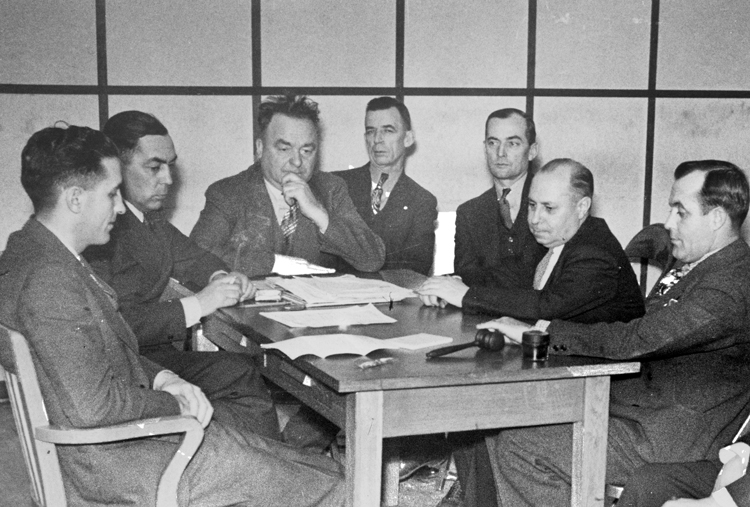One of Pathfinder’s Books of the Month for March is Speeches for Socialism by James P. Cannon. Below is an excerpt from Cannon’s talk at a January 1961 Los Angeles meeting celebrating the life of Carl Skoglund. Both had been inspired by the socialist revolution in Russia in 1917 led by V.I. Lenin and the Bolsheviks. Both were involved in founding the Communist Party in the United States two years later. As a bureaucratic counterrevolution under Joseph Stalin consolidated in the Soviet Union, both joined the fight by Leon Trotsky to continue Lenin’s proletarian internationalist course. Cannon led in founding the Socialist Workers Party, to which Skoglund devoted the rest of his life. Copyright © 1969 by Pathfinder Press. Reprinted by permission.
As you know, from what has been printed in The Militant and your personal knowledge and the remarks of the other speakers, Carl was one of the old guard, one of the founders of our movement, thirty-two years ago. And before that, he was one of the founders of the Communist Party in 1919. And before that, he was active in the Socialist Party in this country since the day he illegally set foot on our sacred soil. He was even a socialist before that, in Sweden, or wherever he came from — he never had any papers to prove it.
I first met Carl in 1923 — that’s thirty-seven years ago — in Minneapolis, while I was on a speaking tour after I had returned from the Soviet Union for the first time. We have been together ever since that first meeting, without a break of any kind. … [I]n the Communist Party we were always together in the same faction. We were together in the foundation of the Trotskyist movement in the revolt against Stalinism.
We have been together in the Socialist Workers Party ever since then, and in all party work. We were together in the big strikes in Minneapolis, where I had a chance to get closer to him and to see him in action in the mass movement and get a profounder appreciation of his many qualities than I had before.
And we were together in prison, and everywhere else. Carl was not alone. I can’t think of him as a single individual. He was one of that remarkable group of worker-Bolsheviks in Minneapolis, who worked and fought so long and so consistently and brought so much credit and glory to our movement in the Minneapolis struggles. And all that remains with us and can never be taken away.
The whole world, I suppose, knows about the Minneapolis strikes. When I was in Europe in the fall of 1934, after the second big strike, I was told by comrades there that every paper in France carried the story of the Minneapolis strikes on the front page, from day to day. It was worldwide news.
The world knows about the big union success in Minneapolis, which played a tremendous role in the creation of the new union movement, beginning with 1934. Carl played a big role in that. As Arne [Swabeck] remarked, he was always one of the leading cadre of Trotskyists who were the center of the whole storm. And later he was elected president of Local 544. …
I personally remember Carl best and most affectionately and most gratefully for the quiet, unobtrusive things he did to help keep The Militant alive in the first hard years, when his name was not known outside the borders of the labor movement in Minneapolis; when he had been blacklisted in three different ways. He had been kicked out of the Central Labor Union because he was a Communist. He had been kicked out of the Communist Party because he was a Trotskyist. And he had been blacklisted on the railroad, where he was a mechanic, a good-paying job, because he had been the chairman of the strike committee in the big strike in 1923.
And in those early days, before he became famous along with the rest of the Minneapolis group, we in New York were isolated and dead broke, didn’t know where to turn to find a few dollars to pay the bills from week to week. Every week was a financial crisis. … We couldn’t close up shop because we had taken upon ourselves the obligation to tell the world the truth about Stalinism and the Russian Opposition and so forth.
Now in those days, Carl Skoglund, as you have been told, worked in a coalyard. And he earned his meager wages by wielding a great big shovel, shoveling coal, long hours a day. And out of the wages he got for that, he donated every week a part to The Militant; sometimes as much as half his week’s wages would be sent to New York to make it possible for us to get the paper out. …
Now Carl was that kind of a socialist! He was always preaching socialism. He talked about it to the workers he met on the job or wherever he would run into them. He talked about it all the time, wherever he was, and he converted many people. Many people in this party owe their first interest in socialism to Carl Skoglund’s persistent efforts. …
You know we run a school, a Trotsky school for six months of the year, and there is a special building on this campsite that houses the students, heated by steam heat. And just a few days before the death of Skoglund, the boiler, the old boiler, gave out and broke down. …
[I]t’s told about in a letter I’ll quote, a letter from our own George [Novack] and Evelyn [Reed], who are there.
She says, “Sunday demonstrated that it was a perfect installation —” Why shouldn’t it be? It had a conscientious mechanic [Skoglund] directing it, and it had to be perfect or he would never have approved.
[T]hey decided they would try to raise the money to pay the expense of the new installation without calling on the National Office, because the National Office is in financial trouble. And there they began a collection, and she says, “Carl offered $100 toward it. Later we discovered he had just $174 to his name.” …
[H]e died with his shoes on, after he had finished his work. That surely is a good way to die. He gave a lot to the movement for the emancipation of mankind. In fact he gave all that he had. But he did not regard it as a sacrifice. For by identifying himself with the human race as a whole, and working for its better future, he found himself and realized himself, and lived a satisfying, purposeful life to the very end. That’s about the best that any of us can hope to do.


